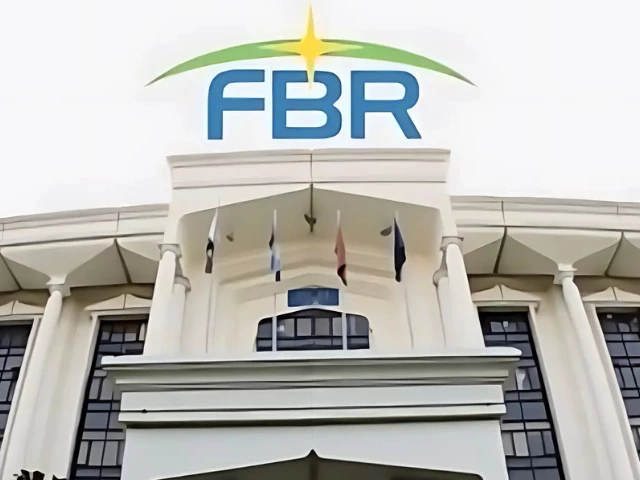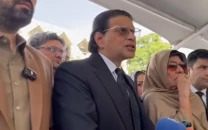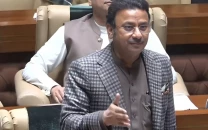New law sharpens FBR teeth amid tax shortfall
President issues ordinance a month before budget

Just a month before the presentation of the budget in parliament, President Asif Ali Zardari has promulgated an ordinance, granting extraordinary powers to taxmen to instantly recover taxes after pronouncements of judgments by superior courts and to depute officers at any premise.
The powers have been obtained by the federal government through ad hoc legislation after the yawning tax shortfall reached to Rs830 billion in 10 months. The government could not wait for the presentation of the budget in the National Assembly, which is expected to be tabled in less than a month.
The tax shortfall is widening with the passage of every month despite imposing record Rs1.3 trillion in additional taxes and Prime Minister Shehbaz Sharif's promise to minimise the gap through recoveries in the court cases.
The ordinance has also empowered the FBR to authorise any employee of the federal or provincial government to seize and confiscate goods being sold without affixing valid tax stamps, bar codes, banderoles, stickers, labels or bar codes.
President Zardari issued the Tax Laws Amendment Ordinance, 2025, which has taken effect from May 2 (Friday), the document showed.
The government has inserted a new section in the Income Tax Ordinance to instantly recover taxes after announcements of judgments by the superior judiciary by relaxing the time limits.
The newly inserted a sub-section — 3A -- in Section 138 states that "notwithstanding anything contained in this ordinance or any other law or any rule, any decision or judgment of any court, forum or authority, the tax payable under any provision of this Ordinance or any assessment order shall become immediately payable or within the time specified in the notice issued by the income tax authority under this subsection, irrespective of the time provided under any other provision or the said decision or judgment, in case the issue giving rise to the tax payable is decided by a High Court or Supreme Court of Pakistan".
After the insertion, the tax will immediately become liable and the government can recover the dues either directly from the party's bank accounts or from third persons who own money to the party.
The amendment has limited taxpayers' ability to defer payment once liability is upheld by superior courts and there could be conflicting judgments of high court and in some cases the all legal issues may not have been raised and adjudicated, said one of legal experts while explaining the amendment.
The Lahore Chamber of Commerce and Industry on Saturday issued a statement against the harsh powers given to the FBR, demanding the prime minister to reverse the decision.
A similar amendment is made in Section 140 where a new sub-section (6A) has been inserted. The amendments would enable the taxmen to go straight to the bank after getting a decision from the court, said the legal experts.
For this fiscal year, the government had given Rs12.97 trillion worth tax target to the FBR and it is already facing Rs830 billion in shortfalls, with two months remaining in the close of the fiscal year. Prime Minister Shehbaz Sharif had promised that at least Rs400 billion would be recovered from the court cases to bridge the gap till June this year.
However, so far, the recoveries remained around Rs36 billion in windfall tax case. The government expected at least Rs120 billion recoveries in the super income tax case and had hoped that Rs100 billion would fall in the month of April. But it did not happen, although hopes remain alive.
Intrusive powers granted
Another amendment in the Income Tax Ordinance has been made and new section — 175C — has been added in the law through ad hoc legislation. The FBR has been given power that its "Chief Commissioner, may post an Officer of Inland Revenue or such other officials with any designation working under the control of the Board or the Chief Commissioner, to the premises of any person or class of such persons, to monitor production, supply of goods or rendering of or providing of services and the stock of goods not sold at any time".
The legal experts argued that the chief commissioner can now post officers inside business premises to monitor production, stock, or services — even for unsold goods — and these amendments reflect a tighter enforcement regime and reduced room for litigation-based delay.
Setting unrealistic targets in the last budget has come to haunt the government, as the cost has so far only been paid by the salaried class and the corporate sector.
FED Law amendment
The government has also obtained powers to authorize any official of the federal or provincial government to seize and confiscate goods, which do not have valid tracing identity.
According to an amendment in the Federal Excise Act, the government has expanded the list of the goods that can be seized and confiscated. Now any goods without affixing or affixing counterfeit tax stamps, bar codes, banderoles, stickers, labels or bar codes can be confiscated by federal and provincial government employees.
According to a third amendment in the FED law, the FBR in case of goods subject to monitoring and counterfeited goods, may authorize any officer or employee of the federal or provincial government to exercise the powers and perform the functions of the Officer of Inland Revenue to seize and confiscate counterfeit goods.























COMMENTS (4)
Comments are moderated and generally will be posted if they are on-topic and not abusive.
For more information, please see our Comments FAQ